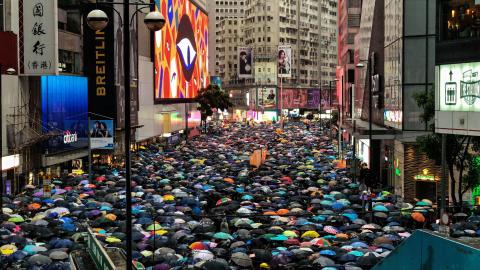New legislation urging the sanctioning of nearly 50 judges and prosecutors in Hong Kong is the latest congressionally led measure designed to up the ante on the Hong Kong government. The bicameral, bipartisan legislation introduced by Senators Dan Sullivan (R-AK) and Jeff Merkley (D-OR) and Representatives Young Kim (R-CA), John Curtis (R-UT), and Jim McGovern (D-MA) puts the Biden administration on the clock – 180 days after the bill passes, the administration will have to justify to Congress why they will or will not sanction these individuals.
The legislation comes after relative inaction from the Biden administration. No sanctions have been issued against individuals in Hong Kong over the past year. While the Biden administration extended temporary Deferred Enforced Departure to Hong Kongers considering asylum in the U.S. – a welcome move – it has done little to hold Hong Kong authorities accountable since their fall from grace.
Now, Chief Executive John Lee – who was sanctioned by the U.S. government in 2020 – is claiming he received a personal invitation to represent Hong Kong at the Asia-Pacific Economic Cooperation (APEC) Forum in San Francisco on November 15th. State Department has yet to deny issuing him an invitation, despite asserting previously that he would not be invited. While John Lee allegedly received an invitation, he will not participate in the forum, according to him, due to scheduling.
John Lee was no bystander in the 2020 crackdown that led to Hong Kong’s downfall; he oversaw acts of police brutality, the imprisonment of over 10,000 political prisoners, and wields the National Security Law like a sword. He is not someone who should be welcomed with open arms by the U.S. government.
While complicity at the top is a given in a place like Hong Kong, the rapid deterioration in the impartiality of the judiciary merits further attention. Once lauded as free and fair, Hong Kong’s judiciary is now complicit in the prosecution and jailing of thousands of political prisoners, including well-known pro-democracy advocates, Jimmy Lai, Gwyneth Ho, and Joshua Wong.
“We all know Hong Kong’s judiciary isn’t the source of pride and independence it used to be,” said Senator Dan Sullivan, the lead sponsor of the “Hong Kong Judicial Sanctions Act” in the Senate. “Since the 2019 - 2020 crackdown, the judiciary in Hong Kong has become an instrument of the CCP to target innocent civilians. My colleagues and I are introducing legislation to focus the Biden administration’s attention on this insidious aspect of the CCP’s takeover of Hong Kong and the regime’s flagrant violation of the civil rights and autonomy promised to Hong Kongers in the Sino-British Joint Declaration.”
The introduction of the bill was met with ire from the Hong Kong government, with John Lee himself condemning it, and other pro-Beijing voices suggesting that the bill’s introduction might lead to Hong Kong political prisoners being tried in the People’s Republic of China rather than in Hong Kong. These empty threats demonstrate the power of potentially sanctioning these judges and prosecutors.
Frances Hui, Policy and Advocacy Coordinator at the Committee for Freedom in Hong Kong Foundation, believes this legislation is warranted. She says:
“Since the imposition of the National Security Law, our movement has moved from the streets into courtrooms as the government put dissidents on trial for standing against the communist China regime. The judges and prosecutors who sit in these court cases have deliberately enabled the government to weaponize the legal system and send pro-democracy activists to jail with their own hands. The Hong Kong Judicial Sanctions Act will support the freedom-loving people of Hong Kong by requiring decisive actions by the US to hold these egregious offenders accountable.”
Congress has long taken the lead on Hong Kong policy, passing the Hong Kong Human Rights and Democracy Act and the Hong Kong Autonomy Act in the wake of crackdowns in 2019 and the draconian institution of the National Security Law. If the Hong Kong Judicial Sanctions Act gains traction like these bills did, it is likely to pass – and that scares the Hong Kong government. There is a continued need for bipartisan support for Hong Kong on Capitol Hill, especially when it’s receiving so little attention from the White House.















